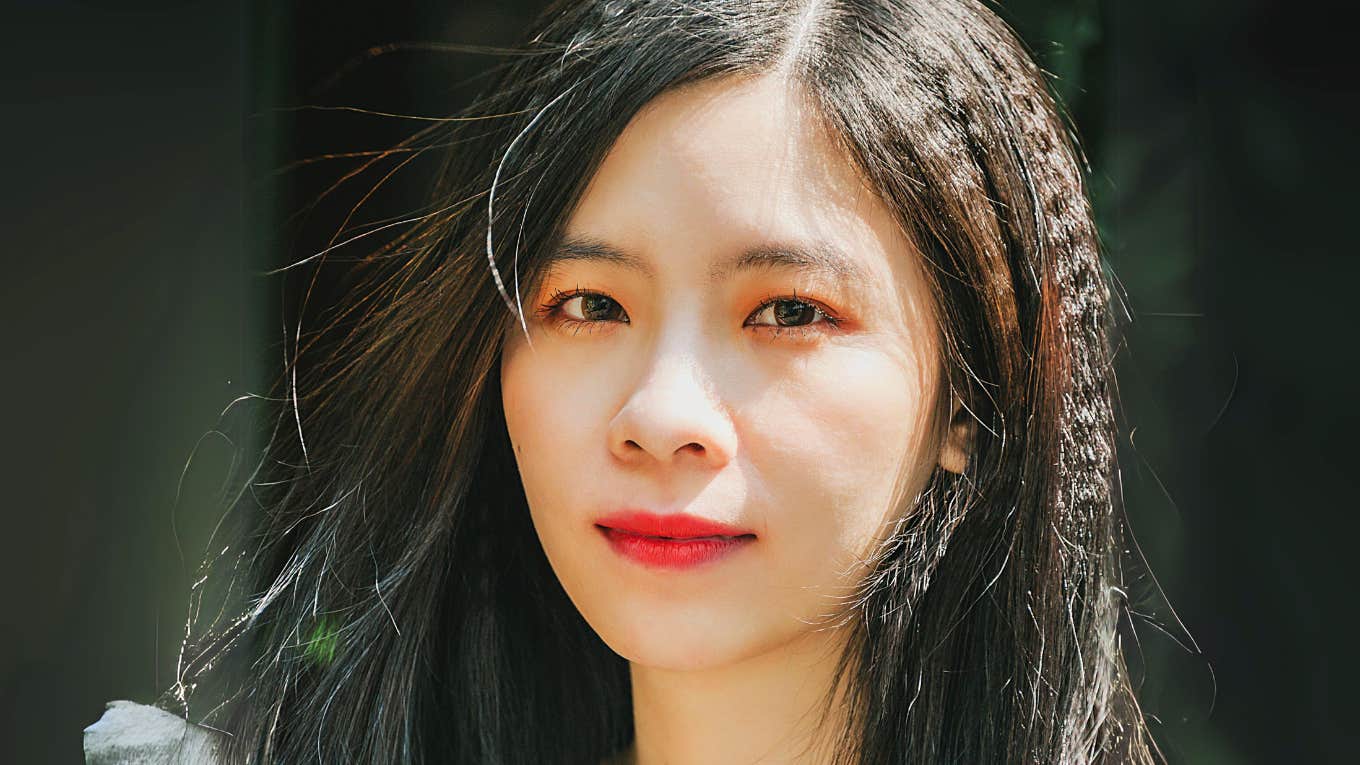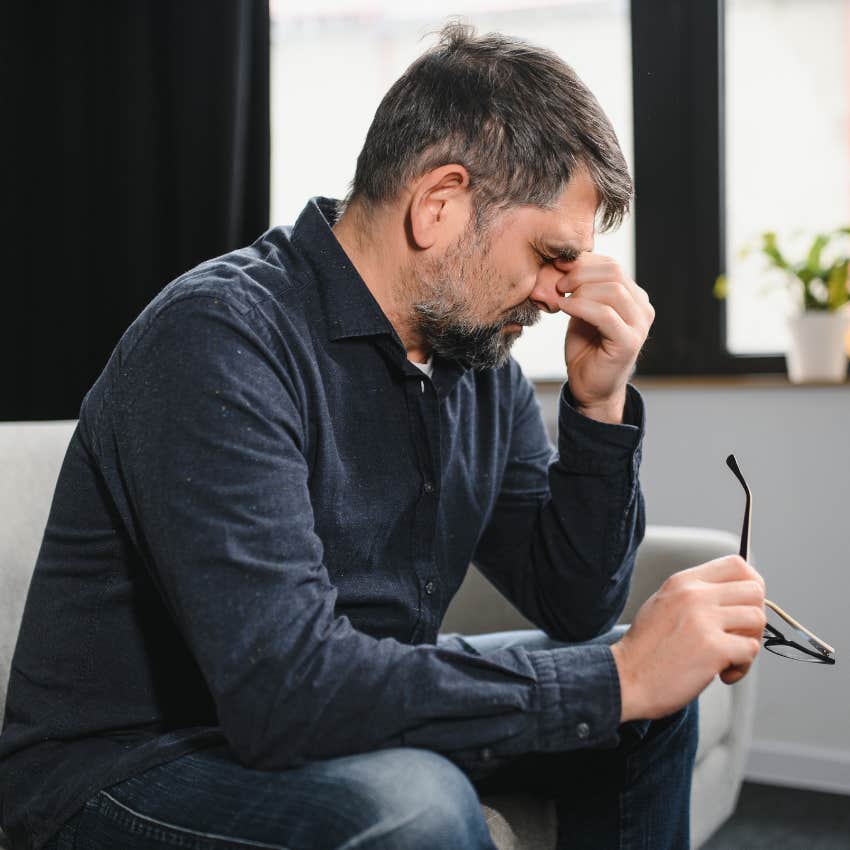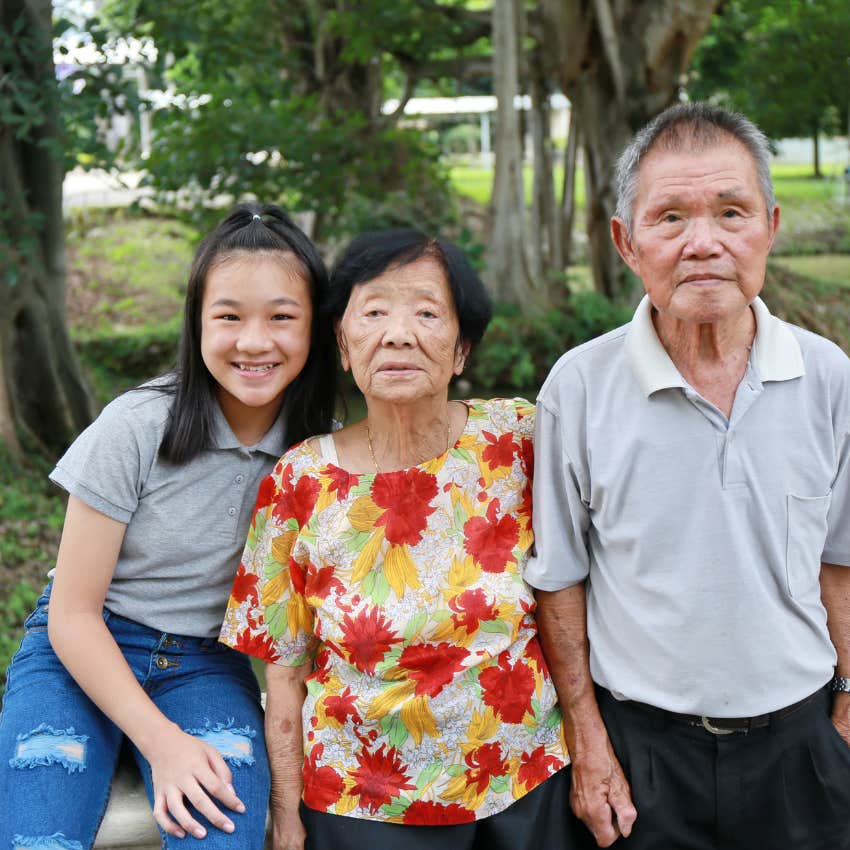Why I Rejected The Lesson My Immigrant Parents Tried Hardest To Teach
The East and West battle inside me.
 Min An | Pexels
Min An | Pexels The other day, I was leaving the grocery store when I saw a white man in his late 60s carrying a bunch of bags also heading towards the exit.
I politely asked him,
“Sir, would you like some help?”
He sneered,
“No thanks. I can do just fine. I’m not as old as you think I look.”
I’m shocked at his response, so I don’t say anything. He walked on, but I stopped to ponder,
“What just happened?”
I thought he would have been pleased to have me help him, that it showed a sign of respect, and he would appreciate the gesture. However, instead, it appeared as though I offended him, doing the opposite of what I had intended.
What comes to mind when you hear the word ‘old’? Frail, feeble, vulnerable, decrepit, senile, elderly, senior, weak, dependent, obsolete, revered, wise, respected, insightful, sage, enlightened, legendary, master, Yoda…
How we interpret a word is largely dependent on our own experiences, personal biases, upbringing, influences, values, and beliefs. You are unique — just like everyone else.
Imagine a white male who grew in Western society. He has a natural talent in sports. He’s the school’s MVP for football, soccer, baseball, hockey and basketball.
His physical ability, strength, endurance, and agility are what make up his self-esteem. His parents praise him, encourage him, and support him. He takes pride in his talent and the hard work he puts into mastering his athletic abilities.
As he enters adulthood, he continues to be active, working as a labourer, playing sports, and working out like a beast at the gym on evenings and weekends.
But when he enters middle age, he finds himself starting to slow down, not being able to move with as much vigor as he did in his youth, getting tired earlier in the evening, and feeling shot after a day of golf. He starts to fear getting old.
 Hryshchyshen Serhii / Shutterstock
Hryshchyshen Serhii / Shutterstock
As he enters his late life, his arthritis gets more severe and flare-ups occur more frequently; his knees, hips, and back hurt every time he gets up. He’s had to slow down more, afraid he’ll lose his balance because his legs aren’t the same as they used to be. He’s insecure about his functional mobility, dwelling on how much his body has changed over the years and how it can’t do what he wants it to.
One day, he goes to a grocery store to pick up some things and while leaving with bags in his arms, he’s approached by a young woman, offering to help him.
He’s flabbergasted. He’s hurt. He’s offended. His insecurities are being brought to light, confirmed to be true by this woman’s gesture. He’s being labelled as an ‘old’ person, someone who appears to need help, someone weak, vulnerable, feeble, elderly, someone he never thought he would become. He brushes her off and continues his day, disappointed at what had just happened. How would I react if I were him?
It’s hard to know how I will feel in thirty years, but this incident made me reflect on my Asian immigrant upbringing and how it shaped the way I think about age and getting old.
As the youngest of 3, I’ve always wanted to be older; playing catch-up to my sisters was a running theme throughout my childhood. From reading their magazines, watching their television shows, listening to their music, to being a fly on the wall while they discussed relationship issues, what they were learning at school, what was going on in their part-time jobs, what they wanted to do after high school, I was mature for my age.
In grade school, someone actually gave me the nickname, “mature girl.” And later on, it became, “old soul.” Growing up, I was in my head a lot, thinking, reflecting, writing in my diary, learning about older people’s lives, their mistakes and making mental (and physical) notes to not make the same ones when I reached that point in life.
I thought about what kind of mom I would be when I was a kid. I thought about how my parents were raising us, what I would keep, and what I would change. I wanted to grow up quickly because I never felt the number reflected how old I felt.
So my birth order and personality affected my views on age, but what about social, cultural, and environmental influences?
Asian culture and the age hierarchy
Growing up as a Chinese Canadian, I often felt like I was a living and breathing war, caught in an eternal conflict between Western and Eastern cultures.
Which values do I resonate with? Which beliefs do I want to own? How do I want to define my identity? Is this a choice for me to make? Or my parents? Or my teachers? Or society?
In Asian cultures, age is significantly valued hierarchically. For instance, in Chinese culture, how family members are referred to depends on whether the person is older/younger than you. This determines their formal title.
I don’t call my cousins ‘cousins’. If they are female and older than me, I have to call them “表姐”. If they are female and younger than me, I call them “表妹.”
I don’t just call my aunts and uncles ‘aunt’ and ‘uncle’. Their title depends on whether they are on my mom or dad's side and whether they are older or younger than the parent they are related to.
These are just a few of the examples of how age is valued in Asian cultures. Generally, the older someone is, the more respect they are entitled to and this philosophy is shared across Asia, from Korea, Japan to China as it is based on Confucian teachings.
Everyone has a position in life, ranked depending on their age (old > young) and gender (males > females), and how people interact with one another should reflect where they stand in this hierarchy. (FYI: As a feminist, I’m going to debate the gender factor another time)
Age hierarchy was drilled into my head throughout my Asian upbringing: Respect your elders
My dad was mainly the one who preached this. Throughout my life, he always acted older than he was. And in many ways, I am similar to him; however, his reasons for behaving beyond his age are different than mine.
Contrary to him, I don’t just want to survive; I want to thrive. I want the years to be meaningful, not just another candle on my birthday cake. I believe I have control over my health, my future, and my destiny.
I can choose to be proactive, making changes to improve my life; death is not the outcome but rather an endpoint. I want to optimize the time I have left on earth, whether it's days or decades, milking the human experience. To him, life is an entire struggle, surviving and getting to the finish line safely — to die at an old age — is a victory.
In his 30s and 40s, he only wanted to be mortgage-free and retired. In his 40s and 50s, he often talked about all the friends and acquaintances who were having heart attacks, strokes, and cancer, and prepared a will. Now in his 60s and nearing 70, he’s thinking about death, and every time someone he knows dies, he crosses a day off the calendar.
Because of his upbringing, growing up during a time when survival was the priority, he values the quantity of life instead of quality. He believes he has little to no control over what happens to his health; death and disease are inevitable, and that there is little he can do to prevent or delay them. Every year he completes, he feels he deserves appreciation and recognition, as that’s how he treats his elders.
Whenever I went to a family dinner as a kid, I’d have to address each adult at the table by their correct formal titles the moment I saw them. It was considered disrespectful if I didn’t do it immediately.
There were times when I’d forget and my dad would give me the side-eye, nudge, then the blatant,
“你有無叫人呀?” (Cantonese)
“Did you address so and so?”
I’d begrudgingly nod, smile, and say the aunt or uncle’s title. I’d rather say:
“Hi, how are you? What’s your name?” “Hey, nice to meet you!” “Hello, it’s great seeing you again.”
A social barrier between the young and the old
The formality and expectation always irked me because it went against my values of building authentic human connections; the age hierarchy created a social barrier between the young and the old.
Respect your elders. Do not speak out of turn. Do not challenge those who are older than you. Do not voice an opposing viewpoint.
Do not ask questions that undermine an elder’s beliefs. Do not ask questions about their personal lives. Do not ask why they said or did something.
The elders are wise and knowledgeable. The young are foolish and impulsive.
And that is one of the many reasons why Asian children who grew up in Western society often have strained relationships with their immigrant parents.
How do we get to know one another when it doesn’t feel safe to speak up?
When my grandparents were children, their parents (my great-grandparents) taught them to respect their elders, disciplined them when they didn’t, and praised them when they did. Then, they had children (my parents), and they were taught the same thing; all of them patiently waited for their turn to become old so they could receive the respect that they gave to their elders.
However, because immigrant parents raised their children in a society that doesn’t emphasize the age hierarchy nor practice Confucian teachings, the beliefs of the younger generation do not align with the older generation.
Immigrant parents don’t get the respect that they think they’ve earned; they’re unable to reap what they believe they’ve sown, creating a greater divide between the two generations than the one between our parents’ and grandparents’.
Although the current generation understands the age hierarchy as they’ve been taught their whole lives, they’re unable to appreciate it in the way their parents, grandparents, great grandparents (and so forth) did.
The generation that grew up in Western culture went through a school system where questions were encouraged, critical thinking skills were taught, and rewards were based on being creative and challenging the status quo. The shows they watched, the celebrities and role models they looked up to all spoke about pursuing their passions and living their dreams over getting a job that pays the bills.
They entered the workforce where being outspoken is valued, having new ideas, solutions, and thinking outside the box is desired.
Contrary to what their immigrant parents’ generation believed in, it’s not about keeping your head down, respecting those in higher positions, and being an obedient worker that pave the way for success; it’s about standing out and speaking up, rubbing shoulders and building relationships with the ‘higher-ups’, the ‘bosses’, the ‘managers’, the ‘elders’ are what grant you the opportunities, promotions, raises, and bonuses.
Respect shouldn’t be age-dependent
 aodaodaodaod / Shutterstock
aodaodaodaod / Shutterstock
I believe in having manners, abiding by laws and authority, demonstrating social etiquette when you enter someone’s home, behaving appropriately and responsibly in public places, saying please and thank you, helping those who are vulnerable, giving to those who are in need, leaning on one another, lending a hand when I see a stranger struggling etc.
These beliefs transcend both Eastern and Western cultures. However, growing up in Western culture has affected my perspective on the age hierarchy.
The ‘respect your elders’ was something that never sat right with me. It’s under the assumption that the older a person is, the more life experience they have and the more they are entitled to my respect. It’s as though the number of years they’ve survived on earth grants them the right to be held in high regard, regardless of how they lived those years.
Age isn’t a determinant of how intelligent, talented, kind, empathetic, wise, and/or knowledgeable someone is. Therefore, we shouldn’t make assumptions about someone because of how old or how young they are.
We should give them the benefit of the doubt, staying impartial until we truly know someone. Just because someone is in their 60s or 70s doesn’t mean they are wiser or smarter than someone in their 20s and 30s. We’ve all met ignorant 70-year-olds and incredibly wise 17-year-olds.
Contradictory beliefs between being old and being perceived as old
In the West, it’s all about the latest and greatest trends and fads to reverse the aging process.
That celebrity is looking fabulous at 50 and she swears by pilates, yoga, drinking lots of water and doing coffee enemas. You need to do exactly as she does.
Keto is the miracle diet that will cure all diseases. Just eat fat and protein all day, every day. Having chia pudding will make you look like you’re in your 20’s again.
Meditation is what keeps the doctor away. You’ll feel like you’re 10 years younger!
In the East, it’s not that different. From Korean face masks, laser treatments, whitening serums, anti-wrinkle creams, lotions, potions, and elixirs, the skin and beauty realm is a multi-billion-dollar industry dominated by Asians. Much of it is dedicated to anti-aging, helping people discover the fountain of youth, preventing the inevitable process of getting old.
Respect me if I’m older than you, but don’t you dare say I look old. I value being old, but I don’t want to show it.
It’s like we want to have our cake and eat it too, and this contradiction mimics the beliefs I have about getting old. At 34, I’m neither young nor middle-aged. I care less about what others think of me than when I was in my 20s; however, I still care and I still have insecurities.
Do I feel good when someone thinks I’m in my 20s?
Yes and no. I’m a mom of 2 and I take pride in prioritizing my health, working out, doing yoga, eating well, getting enough sleep, avoiding the sun, following my skincare routine, etc. And when someone thinks I look younger than my age, they’re validating my efforts and it feels nice.
However, the life stage that I am in now is very different than the one I was in my 20s. I am much more comfortable in my own skin, confident, positive, and self-aware. I would hope how I look reflects that self-assurance.
Do I feel bad when someone thinks I’m in my 40s?
Yes and no. I’m disappointed that my hard work of prioritizing my health isn’t showing, and I’m insecure about the parts of my body that I cannot change. However, it means the life experiences and the pearls of wisdom I have acquired thus far are reflected in the way I present myself.
When I’m old, I just want to be respected like everyone else
I hope that as I get older, I will continue to become more comfortable with myself, that age will allow me to care less about what others think, that I won’t be offended whether someone thinks I’m younger or older than my age, and that my insecurities will have fallen off the face of the earth.
I hope that when I’m my dad’s age, I won’t feel entitled to respect from those younger than me, that I will have earned the recognition and appreciation from others because I will have many stories of successes, failures, adventures and lessons to share, that my ego will have shrivelled into nothingness, and that I will not see my death as doom and gloom but as a celebration of a life well-lived.
And when/if a younger person offers to help me carry my groceries, I’m hoping I’ll respond enthusiastically,
“Why yes, thank you, young person! You’re very kind.”
Katharine Chan is the author of three books and the creator of 60 Feelings To Feel: A Journal To Identify Your Emotions. Her bylines include Verywell Mind, CBC Parents, Mamamia Australia, HuffPost Canada, CafeMom, and many others.

